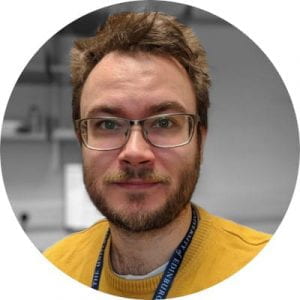 Current role: EPSRC Research Fellow (University of Edinburgh)
Current role: EPSRC Research Fellow (University of Edinburgh)
Read about the Wells Wood Research Group >>
Current research areas: Protein design, protein structure, structural bioinformatics, machine learning and experimental automation.
Overview of PhD project
My project aimed to design a class of protein that is rarely observed in nature, called the alpha-helical barrel. These proteins have interesting properties that we wanted to exploit in a range of applications, such as materials, novel enzymes and pores. I developed computational tools to assist the design process, and went into the lab to test the designs experimentally using biophysical and structural methods.
How did you go about getting your postdoc?
I did a 2-year postdoc in the group that I did my PhD in, which was invaluable for wrapping up projects and publishing results. I then applied for an EPSRC Postdoctoral Fellowship to start my own group, which I was lucky enough to be awarded!
How was the transition from PhD to postdoc?
A post doc is expected to be a lot more independent than a PhD student, which can be quite jarring. My transition from PhD to post doc was made smoother by my supervisor, as he was very supportive and encouraged independence, so by the time I finished my PhD I was confident enough to work independently.
What helped you be successful?
I think it really helped to talk to lots of people from different scientific backgrounds and research interests to get different perspectives when you’re struggling during your PhD. This was made easier by being in the SWBio DTP, as the research in the rest of the cohort is very diverse, so you get lots on interesting perspectives. One other thing that’s really important to remember is that sometimes the best thing to do when you’re struggling with a problem is to take a break. The solution to most of the problems I had during my PhD popped into my head when I was walking down Cantock’s Close to get lunch!
What aspects of the SWBio DTP programme has helped you with your career?
We had some great training in the first year of my PhD. I really benefited from the statistics module, as it filled in a lot of holes in my stats knowledge and really made me interested to develop my stats skills, which is now a major part of my research. We also got some great training around fellowship and grant applications, which really helped prepare me when I was applying for my fellowship.
In particular, how did your PIPS placement help you with your career?
I did my PIPS placement in the Centre for Public Engagement (University of Bristol), developing a workshop about protein design and interdisciplinary science more generally. I’m still heavily involved in public engagement activities, which was an important factor in be being awarded my fellowship as it has a significant public engagement element.
What is the best part of your job?
No other job gives you the same level of intellectual freedom to go and explore ideas, quirks of data or learn new techniques. That’s my favourite thing, closely followed by working with an amazing array of super smart, motivated and engaged people.
What advice would you give other students wishing to follow a career in academia?
Be very selective of the group that you join for your PhD/post docs. Try and make sure that the lab has a friendly, collaborative working environment, with a supervisor you like and can imagine working closely with. Most of the troubles that I’ve seen people have are based on working relationships breaking down and not to do with anything scientific!
